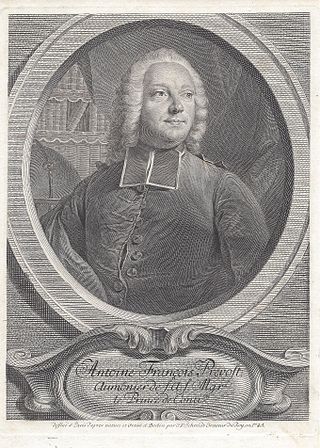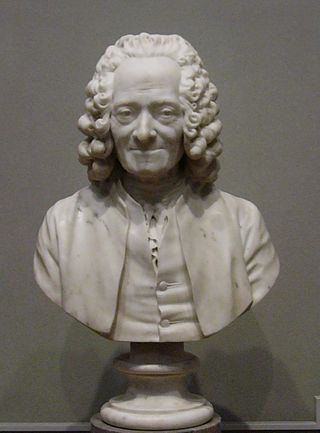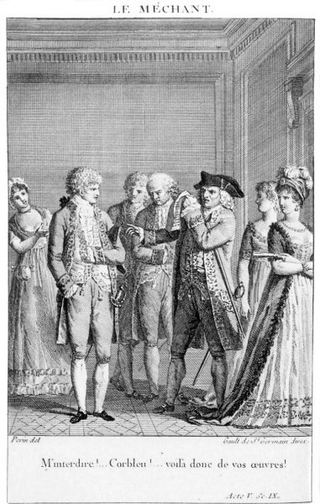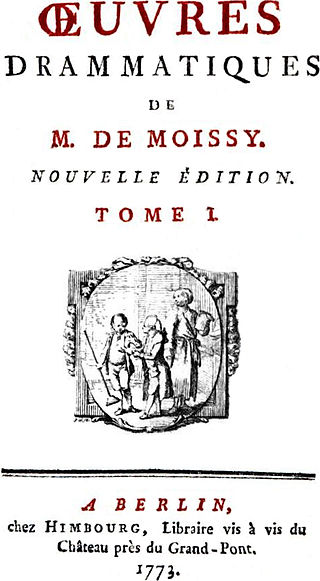
Philippe Néricault Destouches (9 April 1680 – 4 July 1754) was a French playwright who wrote 22 plays.

Philippe Néricault Destouches (9 April 1680 – 4 July 1754) was a French playwright who wrote 22 plays.
Destouches was born at Tours, in today's department of Indre-et-Loire.
When he was nineteen years of age, he became secretary to M. de Puysieux, the French ambassador to Switzerland. In 1716 he was attached to the French embassy in London, where he remained for six years under abbé Dubois.
He later contracted a marriage with Dorothea Johnston, Lancashire lady; however, the marriage was not avowed for some years. In 1727 he portrayed his domestic circumstances in Le Philosophe Marié (The Married Philosopher).
Upon returning to France in 1723, he was elected to the Académie française. In 1727 he acquired considerable estates, the possession of which conferred the privileges of nobility.
He spent his later years at Fortoiseau, his chateau near Melun, and died July 4, 1754.
Destouches wished to revive the comedy of character as understood by Molière, but he thought it desirable that the moral should be directly expressed.
His early comedies were:
The most highly regarded of these is L'Irrésolu (The Irresolute Man), in which Dorante, after vacillating throughout the play between Julie and Climène, marries Julie, but concludes the play with the reflection, "J'aurais mieux fait, je crois, d'épouser Climène" ("I would have done better, I think, to marry Climène").
After eleven years of diplomatic service, Destouches returned to the stage in 1727 with Le Philosophe Marié, followed in 1730 by Les Philosophes Amoureux and in 1732 by Le Glorieux, a picture of the struggle then beginning between the old nobility and the wealthy parvenus who found opportunity in the poverty of France.
He then wrote:
His later comedies were:
His last three plays were produced posthumously. They were:
Destouches's 1717 dramatic comedy L'Obstacle Imprévu (Act I, sc. vi) was the origin of the oft-quoted maxim, “The absent are always in the wrong.” [1] Bergen Evans, in his Dictionary of Quotations, said:
“Though Néricault ... is credited with the first statement of this thought in this form, the idea is old and, in other forms, universal.” [2]
In "le Glorieux" he wrote "To critic is easy, only the art is difficult".

Pierre Carlet de Chamblain de Marivaux, commonly referred to as Marivaux, was a French playwright and novelist.

Antoine Houdar de la Motte was a French author.

Antoine François Prévost d'Exiles, usually known simply as the Abbé Prévost, was a French priest, author, and novelist.

Pierre-Claude Nivelle de La Chaussée was a French dramatist who blurred the lines between comedy and tragedy with his comédie larmoyante.

Ferdinand Berthoud, was a scientist and watchmaker. He became master watchmaker in Paris in 1753. Berthoud, who held the position of Horologist-Mechanic by appointment to the King and the Navy, left behind him an exceptionally broad body of work, in particular in the field of marine chronometers.

18th-century French literature is French literature written between 1715, the year of the death of King Louis XIV of France, and 1798, the year of the coup d'État of Bonaparte which brought the Consulate to power, concluded the French Revolution, and began the modern era of French history. This century of enormous economic, social, intellectual and political transformation produced two important literary and philosophical movements: during what became known as the Age of Enlightenment, the Philosophes questioned all existing institutions, including the church and state, and applied rationalism and scientific analysis to society; and a very different movement, which emerged in reaction to the first movement; the beginnings of Romanticism, which exalted the role of emotion in art and life.
Louis Fuzelier was a French playwright.

Gabriel-Vincent Thévenard was a French operatic baritone.
Pierre-Charles Roy was a French poet and man of letters, noted for his collaborations with the composers François Francoeur and André Cardinal Destouches, to produce librettos for several opera-ballets, on classical subjects or pseudo-classical pastiches, for seven tragedies, and for his rivalry with the young Voltaire, who immortalised Roy with some disdainful public words.
Les amours de Ragonde is an opera in three acts by Jean-Joseph Mouret with a libretto by Philippe Néricault Destouches. It was first performed at the Château de Sceaux in December, 1714. It is one of the first French comic operas.

Louis de Boissy was an 18th-century French poet and playwright. He was elected to seat 6 of the Académie française on 12 August 1754. He wrote satires and several comedies, of which the best is Les Dehors trompeurs ou l'Homme du jour, the great success of the 1740 season, with a cast including Quinault-Dufresne and Jeanne Quinault. Boissy had the concession to print the Mercure de France. His son was Louis Michel de Boissy. The historian Louis Michel de Boissy was his son.

Abraham-Alexis Quinault, called Quinault-Dufresne, was a French actor. He was a member of the Quinault family of actors.
The abbé Simon-Joseph Pellegrin (1663 – 5 September 1745) was a French poet and playwright, a librettist who collaborated with Jean-Philippe Rameau and other composers.

Le Méchant is a 1747 play by Jean-Baptiste-Louis Gresset. It is considered the best verse comedy of the eighteenth-century French stage.

Alexandre Guillaume Mouslier de Moissy, was a French writer and dramaturge. He was born in 1712 in Paris where he died on 8 November 1777.
Events from the year 1680 in France.
François Parfaict, was an 18th-century French theatre historian. His brother was Claude Parfaict (1701–1777), also a theatre historian. Their most notable works were collaborations, including Histoire du théâtre françois depuis son origine jusqu’à présent and Dictionnaire des théâtres de Paris.
The Married Philosopher is a 1732 comedy play by the writer John Kelly. It was inspired by the 1727 play Le Philosophe Marié by the French writer Philippe Néricault Destouches.